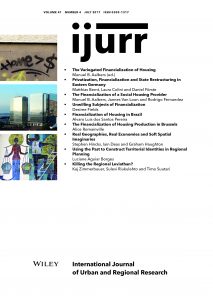The financialization of housing has been increasingly identified as an important driver of social and economic change in contemporary capitalism. Focusing on the Brazilian context, this article considers the extent to which recent changes in housing regulations, policies and markets confirm or challenge narratives about the financialization of housing in the international academic debate. I argue that while many of the trends stressed in the literature are apparent, more extreme processes of financialization within the Brazilian housing sector remain limited––not only because of institutional and regulatory constraints, path dependence or political resistance, but also because of fundamental structural conditions of Brazil’s position as a peripheral economy. Three different but mutually reinforcing processes are scrutinized in order to evaluate the financialization of housing and its limits in Brazil: the re-regulation of the real estate financial sector initiated in the 1990s; the changing funding patterns among real estate companies since the mid-2000s; and the increasing commodification of housing induced by a large-scale and heavily subsidized housing program launched in 2009.
Details
Written by:
Alvaro Luis Dos Santos Pereira
Digital Object Identifier (DOI)
10.1111/1468-2427.12518
About DOI

